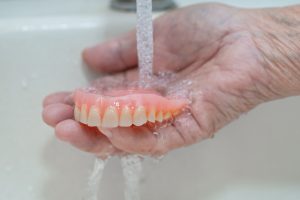Custom-fit dentures have become a trusted solution for restoring oral function and appearance after tooth loss. Whether you’re new to wearing dentures or adjusting to a recent set, achieving day-to-day comfort is essential. Properly fitted dentures should support chewing, improve speech, and contribute to overall confidence, without causing discomfort or irritation.
While advances in dental prosthetics have made custom dentures more precise than ever, the transition period often involves an adjustment phase. Minor discomfort, pressure points, or issues with stability can occur, especially in the early stages. Fortunately, there are proven strategies and dentist-recommended practices that can significantly improve the comfort and functionality of your dentures.
In this blog, we’ll share essential comfort tips to help you adapt to and maintain your custom-fit dentures, which Ipswich dental professionals recommend. These practical steps are designed to enhance your experience, reduce irritation, and ensure a proper fit over time. Whether you’re managing new dentures or seeking better outcomes with your current set, these insights will support your journey toward optimal oral health and long-term comfort.
7 Dentist-Recommended Comfort Tips for Denture Wearers
Ease in with Soft Foods First:
After getting new dentures, give your mouth a break-in period. Start with soft, easy-to-chew foods before graduating to anything crispy or tough. Health experts strongly recommend cutting food into small pieces and chewing slowly when you first start wearing dentures. If you feel sore spots or slipping even with soft meals, stop and call your denture clinic for an adjustment.
Use a Little Denture Adhesive for Extra Grip:
Denture adhesive isn’t for everyone, but it can be a real confidence booster, especially if your lower denture feels loose. Better Health Channel notes that some wearers benefit from a dab of adhesive, which creates a thin cushion between the denture and gums that helps keep teeth in place. This can prevent awkward moments of clicking or slipping when you talk and chew. Just make sure to use a product made for dentures and follow the instructions. Adhesive is a helper, not a substitute for a good fit. If you’re needing tons of glue or still experience discomfort, book a review of your dentures may need adjusting.
Practice Talking and Chewing Aloud:
New dentures can affect speech and tongue placement, so give yourself some practice time. The tongue needs a few days to learn the contours of the new teeth. When chewing, avoid biting with just your front teeth. Instead, bite and then chew with your back teeth on both sides of the mouth to balance the force. If you notice clicking or looseness while talking or laughing, that’s another sign that an adhesive or a reline by your prosthetist might help. If persistent clicking, gum discomfort, or looseness continues after a couple of weeks, book a check-up with your denturist to make sure everything is seated perfectly.
Master a Simple Cleaning Routine:
Keeping your dentures clean is critical; good hygiene prevents soreness, bad breath, and infections. Aim to clean your dentures twice a day and rinse them after every meal. Follow these steps:
- Rinse after meals: After eating, remove your dentures and rinse out any loose bits under running water. This helps prevent food from baking on.

- Brush daily: Every morning and evening, brush all surfaces of the denture with a soft toothbrush using mild or fluoride toothpaste. Do not use regular toothpaste, as its abrasives can scratch acrylic dentures.
- Soak overnight: After cleaning, pop your dentures in a clean denture bath filled with fresh water overnight. This keeps them moist, so they retain their shape. Remove them in the morning, rinse, and they’re ready for another day.
Schedule Regular Check-Ups and Adjustments:
Just like a car needs a tune-up, dentures need occasional check-ups. Over time, your jawbone and gums naturally shrink and change shape; even slight changes can make a previously perfect denture feel loose or uneven. Dentists generally recommend visiting your denture specialist at least once a year to inspect the fit. Don’t wait until pain strikes: if you notice soreness, rubbing, or if the denture starts to feel wobbly, book an adjustment. Your prosthetist can reline the denture base or make tiny tweaks to eliminate pressure points. Quick fixes like cushiony liners or gentle grinding can make a world of difference. This proactive care keeps you eating and smiling confidently.
Give Your Mouth a Nightly Break:
It’s very important to remove your dentures before sleep. Wearing dentures 24/7 can stress the soft tissues and even lead to fungal infections in rare cases. Removing them gives your mouth a chance to breathe and recover overnight. When off your gums, store them in a clean container of fresh water. Australian health sources point out that taking dentures out at night is a key part of keeping your mouth healthy. Use the time to gently massage your gums and tongue with a soft brush, it improves circulation and comfort.
Fix Problems ASAP:
Finally, be ready to act quickly if something goes wrong. Dentures, even custom-made ones, can chip, crack, or wear down. Never try to fix a broken denture with household glue; that can make things worse or toxic. Instead, contact your denture clinic immediately. They can patch cracks, replace missing teeth, reline an ill-fitting base, or add teeth if needed. For loose dentures, a quick reline or snug adjustment is far safer than enduring pain. A fast professional repair prevents small chips from becoming big breaks and helps maintain your oral health.
Conclusion
Wearing dentures should enhance your daily life, not disrupt it. Ensuring your custom-fit dentures are both comfortable and functional is essential to maintaining your quality of life. Throughout this guide, we’ve explored seven dentist-recommended tips that address common comfort concerns – from easing into eating and speaking, to cleaning routines, using adhesives correctly, and knowing when to seek professional adjustments.
Each of these strategies plays a role in improving fit, minimising irritation, and ensuring your dentures continue to serve you effectively over time. Regular maintenance, professional check-ups, and mindful day-to-day habits can make a significant difference in how your dentures feel and function.
Take the first step towards better oral comfort and peace of mind. Book a free consultation with Raceview Complete Denture Care, your trusted local expert for custom dentures, relines, and denture repairs in Ipswich and surrounding areas. Let us help you smile with confidence again.
FAQs:
What services does Raceview Complete Denture Care offer?
We provide a full range of denture services, including custom denture solutions, same-day denture repairs, adjustments, and relines for a comfortable fit, and even protective mouthguards.
Are custom-fit dentures worth it?
Absolutely. Custom-fit dentures are tailored to your unique mouth shape and bite, providing much better comfort and function than “off-the-shelf” alternatives. Every custom denture is meticulously crafted with your comfort and health.
How often should I have my dentures checked or repaired?
Follow-up schedules vary, but a good rule is to have them checked annually if there are no issues. However, any time you feel pain, notice looseness, cracking, or food trapping, book an appointment right away. Keeping those appointments ensures your dentures remain a comfortable fit.



